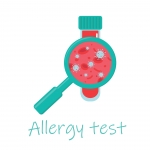Food Allergies and Intolerances
May 15 / CATEGORY: Nutrition
Estimated Read Time: 3 minutes 40 seconds
According to the Asthma and Allergy Foundation of America, over 100 million people suffer from various types of allergies each year. The month of May serves as Allergy Awareness Month, which includes food, environmental, medical, and other allergies. Allergy awareness is important because they are a lot more common than we may think.
Environmental allergies can happen at various times of the year but tend to rise as the warmer months approach. Some common types of environmental allergens are tree, grass, and ragweed pollen. These seasonal allergies are treatable by using over the counter allergy medications such as Claritin, Zyrtec, and Flonase. Depending on the severity, seek help from your PCP or an allergist for your environmental allergies to receive the care you need. For further information on non-food related allergens, refer to the American Academy of Allergy, Asthma and Immunology (AAAAI).
Millions of individuals are allergic to more than 160 different foods implicated in food allergies, although there are select groups of foods that are more common allergens than others. In 2004 the FDA established the “Big 8” – the top 8 groups that cause food-allergic responses. This list remained the same until 2021 when a new bill added a 9th major allergen creating the “Big 9”:
-Milk
-Egg
-Peanuts
-Tree Nuts (including almonds, walnuts, and cashews)
-Fish (including pollock, salon, cod, and tuna)
-Shellfish (including shrimp, lobster, and crab)
-Soy
-Wheat
-Sesame
Allergies and intolerances both cause us to feel unwell, but what makes the two different?
 An intolerance is when your body is unable to digest a certain component of food properly, such as the lactose sugar found in milk. With an intolerance, you may be able to tolerate eating small amounts of trouble foods, but in higher amounts will experience symptoms. When experiencing an intolerance reaction, abdominal cramping, diarrhea, and nausea are common symptoms. These symptoms, while unpleasant, are not life threatening.
An intolerance is when your body is unable to digest a certain component of food properly, such as the lactose sugar found in milk. With an intolerance, you may be able to tolerate eating small amounts of trouble foods, but in higher amounts will experience symptoms. When experiencing an intolerance reaction, abdominal cramping, diarrhea, and nausea are common symptoms. These symptoms, while unpleasant, are not life threatening.
Food allergies are when your immune system reacts to a protein compound in food that is perceived as harmful. This triggers a chain reaction immune response to the allergen that forms antibodies. Symptoms can occur immediately or over time and range from mild to severe. Some common symptoms itching, hives, and breathing problems, which can create discomfort and can be potentially life-threatening.
For further information on how to identify food allergies versus a food intolerance and how to receive the care you need, check out this video!
In addition to allergies and intolerances, some individuals may declare a food sensitivity. Sensitivities are not an official diagnosis; however, administration of food sensitivity tests are growing in

popularity. These tests examine immunoglobulin G (IgG) antibodies which are not proven to identify food allergies or sensitivities. IgG tests are ‘memory’ tests to foods that have been consumed; IgGs are normally produced after eating any type of food and are not specific to a sensitivity. IgG numbers are positively correlated to quantity and frequency of the food consumed, e.g., the frequently you eat a specific food, your IgG numbers will also rise. While marketed in a persuasive manner, these tests lack any evidence to support diagnosis of a negative reaction to food and can lead to unnecessary restriction and avoidance of certain foods.
In contrast to sensitivity tests, food allergy tests are quite reliable. These tests are blood tests skin pricks that will use blood sampled to measure immunoglobulin E (IgE) to diagnose an allergy. IgE antibodies indicate an immune response, the same type of response that occurs during an allergic reaction. Listen to this podcast episode, “Am I Actually Allergic? The Truth About Food Allergies, Intolerances, & “Sensitivities”
Food allergies and intolerances can add challenges when dining out and aiming to consume a balanced diet. It is important to be cautious in restaurant settings as well as when purchasing processed packaged foods to avoid cross contamination. Be safe by reading the ingredients and speaking with a server or staff member when eating out.
If you are unsure if you have an allergy, intolerance, or if it is a sensitivity, speak with your PCP, an allergist, or dietitian to receive the proper care and treatment. If food testing is appropriate, remember that we must test IgE and not IgG to illicit an immune response and receive accurate results.
If you or someone you know suffer from an allergy, intolerance, or sensitivity and are struggling with maintaining a balanced dietary intake, book a nutrition session with the RecSports dietitian to receive some guidance.
This post was co-written by:
Jessie is a Registered Dietitian and Assistant Director for Fitness & Wellness at University of Florida’s Department of Recreational Sports where she does individual nutrition counseling and coaching with the UF community. Follow her on Instagram for more nutrition tidbits.
Rachel is a 4th year UF Pre-professional Biology student and Program Assistant with Nutrition Services at the Department of Recreational Sports.
